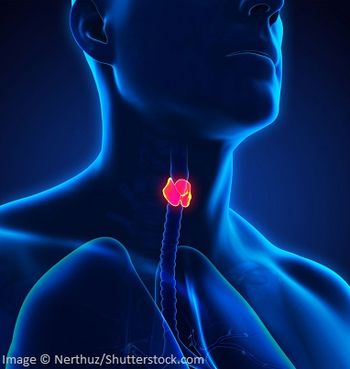
PD-L1 a Potential Target in Thyroid Cancer?
Immune checkpoint inhibitor therapy is looking increasingly plausible as a potential investigative strategy for treating thyroid cancers.
Immune checkpoint inhibitor therapy is looking increasingly plausible as a potential investigative strategy for treating thyroid cancers, suggest early findings from studies presented this week at the 15th International Thyroid Congress (ITC) and 85th Annual Meeting of the American Thyroid Association (ATA) in Lake Buena Vista, Florida.
The programmed cell death 1 (PD-1) receptor and the programmed death ligand 1 (PD-L1) protein are involved in some tumors’ ability to evade or suppress patients’ antitumor immune responses, via mechanisms that appear to include suppression of immune CD8+ T cells. In some cancers, PD-L1 overexpression is associated with poor prognosis.
Targeted inhibition of the PD-1/PD-L1 immune-checkpoint pathway has generated excitement in recent years as a promising strategy for treating melanoma, non–small-cell lung cancer, and renal and colorectal cancers.
Now, researchers are exploring the role of the PD-1/PD-L1 pathway in thyroid cancer-with intriguing early results from retrospective studies.
“Our findings suggest that PD-L1 expression in tumor cells and adjacent microenvironment correlates with aggressive metastatic PTC [papillary thyroid cancer] and shortened survival, and could justify the potential application of anti PD-1/PD-L1 immunotherapy for such refractory patients,” said Paul G. Walfish, MD, of the Mount Sinai Hospital in Toronto.
Patients with PD-L1-expressing tumor cells had significantly shorter median disease-free survival (DFS) times than those with PD-L1–negative tumor cells (DFS: 60 months vs 186 months; P = .001), Dr. Walfish said. “The highest PD-L1 levels were observed in PTC stages III–IV, compared to stages I–IIA and benign thyroid nodules,” he noted.
“PD-L1 immunopositivity in tumor infiltrating lymphocytes also correlated with reduced DFS,” he was quick to add. “High PD-L1 expression was associated with PTC aggressiveness and could identify those patients who would require more aggressive follow-up surveillance and therapy,” he speculated.
Other researchers reported similar findings.
PD-L1 expression, as well as mutant-BRAF expression, are associated with “worse outcomes in thyroid cancer patients,” reported the lead author of another immune-checkpoint study reported at the ITC/ATA meeting, Erica Han, MD, of the Winship Cancer Institute, Emory University, in Atlanta.
Her team retrospectively analyzed PD-1 and PD-L1 microarray expression in resected thyroid tumor tissue from 223 patients.
“Higher expression of PD-L1 but not PD1 was associated with an increased risk of death” (P < .001), Dr. Han reported. “PD-L1 expression was more than two-fold higher in tumors of deceased patients and of patients with distant metastasis.”
Dr. Han’s team found no significant difference in PD-1 expression or infiltrating CD8+ lymphocytes “across all categories of patients or tumor characteristics.”
Her team’s study population of 200 patients was reflective of the general thyroid cancer population, Dr. Han said.
“Further studies of PD-L1 expression as a prognostic biomarker and as a target of therapy in thyroid cancer are warranted,” she said.
Newsletter
Stay up to date on recent advances in the multidisciplinary approach to cancer.





































